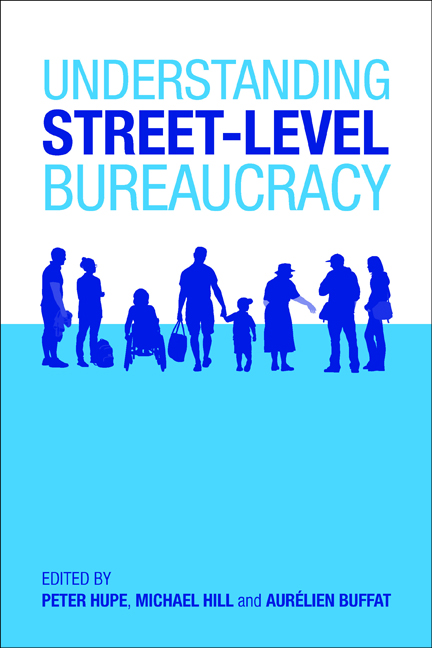Book contents
- Frontmatter
- Contents
- Biographical notes
- Preface
- Part One Introduction
- Part Two Delivering services and benefits: street-level bureaucracy and the welfare state
- Part Three Agents of the state: street-level bureaucracy and law enforcement
- Part Four Embedded in society: street-level bureaucrats as public actors
- Part Five The management of street-level bureaucrats
- Part Six The promise of professionalism
- Part Seven Conclusion
- References
- Index
Two - The inside story: street-level research in the US and beyond
Published online by Cambridge University Press: 08 March 2022
- Frontmatter
- Contents
- Biographical notes
- Preface
- Part One Introduction
- Part Two Delivering services and benefits: street-level bureaucracy and the welfare state
- Part Three Agents of the state: street-level bureaucracy and law enforcement
- Part Four Embedded in society: street-level bureaucrats as public actors
- Part Five The management of street-level bureaucrats
- Part Six The promise of professionalism
- Part Seven Conclusion
- References
- Index
Summary
Introduction
Over more than three decades, street-level theory and research has captured the imagination and empirical attention of scholars, generating important insights into the links between the practical and the political. Since Michael Lipsky (1980) first offered his theoretical template for understanding street-level bureaucracies (street-level bureaucrats), the field has grown considerably, with diverse lines of research taking up issues that are central to street-level theory and also extending it in significant ways.
At the outset, it is worth noting that the term ‘street-level bureaucracy’ has become something of a term of art, a generic label for the public agencies that are so deceptively familiar. The term often conjures up images of prototypical Weberian bureaucracies, those relentlessly routinised people-processing agencies that represent the authority of the state and invite caricatures of ‘le guichet’ (the individual behind the counter) or the officious clerk with the green eyeshades. However, the term also encompasses the more ambivalent protagonists of the modern state, the social workers, police, educators, counsellors and case managers, whose interventions into people's personal lives may be appreciated or reviled. They may be celebrated as first responders to those needing help or protection, or they may find themselves the first targets of citizen dissatisfaction. The personal and, at times, invasive interactions between private individuals and street-level bureaucrats make their work deeply fraught, at once potentially helpful and potentially alienating.
A distinctive contribution of street-level research is its commitment to investigating what I refer to as the ‘inside story’, that is, what goes on in the often-hidden recesses of organisations that deliver public policy, what factors systematically shape those practices and the consequences of street-level practices for policy and, more broadly, for politics.
This field initially developed in the US in the context of emerging interest in the problematics of policy implementation, concerns that continue to animate contemporary policy-focused research. Over time, street-level studies expanded to take up more fundamental and also more far-reaching theoretical and empirical questions, among them, questions regarding the dynamics between organisational structures and discretionary behaviour, the influence of new managerial and governance arrangements on organisational practices, and the role of street-level organisations in the broader politics of the welfare state.
- Type
- Chapter
- Information
- Understanding Street-Level Bureaucracy , pp. 25 - 42Publisher: Bristol University PressPrint publication year: 2015
- 6
- Cited by



